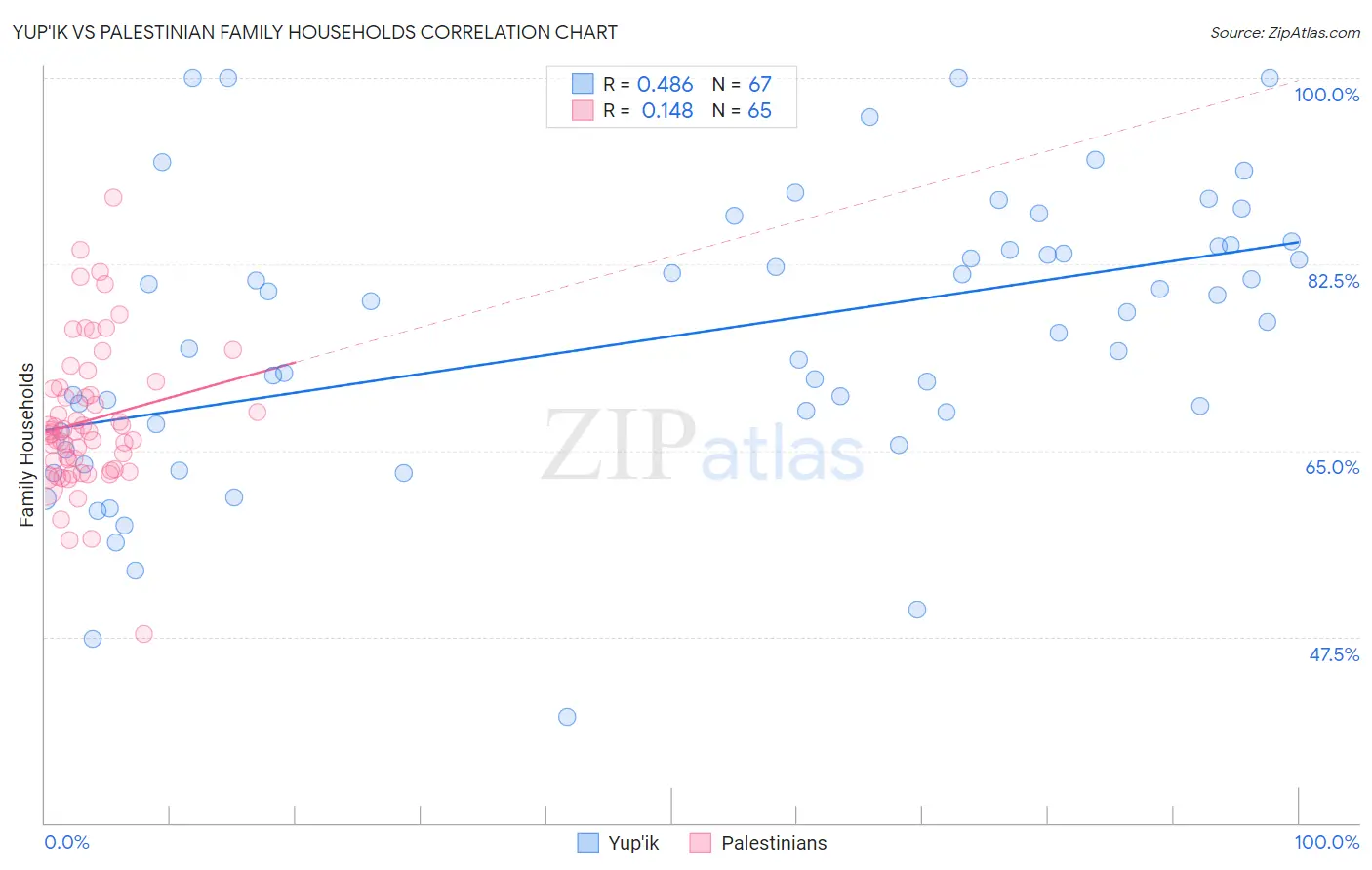Yup'ik vs Palestinian Family Households
COMPARE
Yup'ik
Palestinian
Family Households
Family Households Comparison
Yup'ik
Palestinians
72.4%
FAMILY HOUSEHOLDS
100/ 100
METRIC RATING
1st/ 347
METRIC RANK
65.1%
FAMILY HOUSEHOLDS
97.2/ 100
METRIC RATING
108th/ 347
METRIC RANK
Yup'ik vs Palestinian Family Households Correlation Chart
The statistical analysis conducted on geographies consisting of 39,956,676 people shows a moderate positive correlation between the proportion of Yup'ik and percentage of family households in the United States with a correlation coefficient (R) of 0.486 and weighted average of 72.4%. Similarly, the statistical analysis conducted on geographies consisting of 216,401,165 people shows a poor positive correlation between the proportion of Palestinians and percentage of family households in the United States with a correlation coefficient (R) of 0.148 and weighted average of 65.1%, a difference of 11.3%.

Family Households Correlation Summary
| Measurement | Yup'ik | Palestinian |
| Minimum | 40.0% | 47.7% |
| Maximum | 100.0% | 88.8% |
| Range | 60.0% | 41.1% |
| Mean | 75.6% | 67.8% |
| Median | 77.1% | 66.8% |
| Interquartile 25% (IQ1) | 66.8% | 63.2% |
| Interquartile 75% (IQ3) | 84.2% | 70.8% |
| Interquartile Range (IQR) | 17.4% | 7.7% |
| Standard Deviation (Sample) | 13.2% | 6.9% |
| Standard Deviation (Population) | 13.1% | 6.8% |
Similar Demographics by Family Households
Demographics Similar to Yup'ik by Family Households
In terms of family households, the demographic groups most similar to Yup'ik are Spanish American Indian (71.2%, a difference of 1.8%), Tongan (69.6%, a difference of 4.0%), Yakama (69.3%, a difference of 4.5%), Yuman (69.3%, a difference of 4.5%), and Immigrants from Mexico (69.1%, a difference of 4.8%).
| Demographics | Rating | Rank | Family Households |
| Yup'ik | 100 /100 | #1 | Exceptional 72.4% |
| Spanish American Indians | 100.0 /100 | #2 | Exceptional 71.2% |
| Tongans | 100.0 /100 | #3 | Exceptional 69.6% |
| Yakama | 100.0 /100 | #4 | Exceptional 69.3% |
| Yuman | 100.0 /100 | #5 | Exceptional 69.3% |
| Immigrants | Mexico | 100.0 /100 | #6 | Exceptional 69.1% |
| Mexicans | 100.0 /100 | #7 | Exceptional 69.0% |
| Immigrants | Fiji | 100.0 /100 | #8 | Exceptional 68.8% |
| Native Hawaiians | 100.0 /100 | #9 | Exceptional 68.4% |
| Immigrants | Philippines | 100.0 /100 | #10 | Exceptional 68.3% |
| Immigrants | Central America | 100.0 /100 | #11 | Exceptional 68.3% |
| Koreans | 100.0 /100 | #12 | Exceptional 68.3% |
| Pueblo | 100.0 /100 | #13 | Exceptional 68.2% |
| Immigrants | Cuba | 100.0 /100 | #14 | Exceptional 68.2% |
| Assyrians/Chaldeans/Syriacs | 100.0 /100 | #15 | Exceptional 68.2% |
Demographics Similar to Palestinians by Family Households
In terms of family households, the demographic groups most similar to Palestinians are White/Caucasian (65.1%, a difference of 0.010%), Alaska Native (65.1%, a difference of 0.010%), English (65.1%, a difference of 0.020%), Immigrants from Guatemala (65.0%, a difference of 0.040%), and Scandinavian (65.0%, a difference of 0.050%).
| Demographics | Rating | Rank | Family Households |
| Chileans | 98.1 /100 | #101 | Exceptional 65.2% |
| Immigrants | Sri Lanka | 98.0 /100 | #102 | Exceptional 65.1% |
| Indians (Asian) | 97.9 /100 | #103 | Exceptional 65.1% |
| Spaniards | 97.8 /100 | #104 | Exceptional 65.1% |
| English | 97.4 /100 | #105 | Exceptional 65.1% |
| Whites/Caucasians | 97.3 /100 | #106 | Exceptional 65.1% |
| Alaska Natives | 97.3 /100 | #107 | Exceptional 65.1% |
| Palestinians | 97.2 /100 | #108 | Exceptional 65.1% |
| Immigrants | Guatemala | 96.9 /100 | #109 | Exceptional 65.0% |
| Scandinavians | 96.8 /100 | #110 | Exceptional 65.0% |
| Europeans | 96.8 /100 | #111 | Exceptional 65.0% |
| Immigrants | Jordan | 96.5 /100 | #112 | Exceptional 65.0% |
| Spanish | 96.2 /100 | #113 | Exceptional 65.0% |
| Argentineans | 95.7 /100 | #114 | Exceptional 65.0% |
| Ecuadorians | 95.4 /100 | #115 | Exceptional 65.0% |